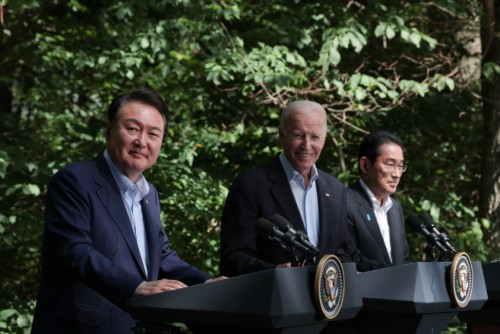 |
| South Korean President Yoon Suk-yeol and his U.S. and Japanese counterparts, Joe Biden and Fumio Kishida, address a joint press conference at Camp David in Maryland on Aug. 18, 2023./ Source: Presidential Office |
AsiaToday reporter Hong Sun-mi
The leaders of South Korea, the U.S., and Japan declared a three-nation alliance at the Camp David Summit, launching a new international order in the Indo-Pacific region.
With the creation of a stronger security and economic bloc against North Korea, China, and Russia, international dynamics are said to have entered a new era of great historic transformation.
The tree-way cooperation among South Korea, the U.S., and Japan is expected to create a stronger unity than the existing U.S.-led AUKUS and Quad, raising expectations for the Asian version of NATO.
President Yoon Suk Yeol and his U.S. and Japanese counterparts, Joe Biden and Fumio Kishida, adopted three documents concerning trilateral security cooperation as well as the “principles” and the “spirit” of their historic summit at Camp David in Maryland on Friday.
The three leaders stressed that a “new era of South Korea-U.S.-Japan relations has begun” in a joint statement that resolved comprehensive and pan-regional cooperation between the three countries.
“We recognize that we are stronger, and the Indo-Pacific is stronger, when the Republic of Korea, the United States, and Japan stand as one,” they pointed out.
The three countries agreed to hold regular summits and joint military drills to jointly respond to regional security issues, including North Korea’s nuclear and missile provocations. In addition to security, a number of trilateral consultative bodies have also been established to strengthen cooperation in various fields, including economy, supply chain, finance, advanced technologies, and cybersecurity, to dramatically increase the solidarity of the three countries.
The “spirit” document adopted by the three leaders is a joint statement containing comprehensive cooperative measures among the three countries. The “principles” document contains principles that should be maintained in the process of promoting cooperation among the three countries.
As a result, the leaders of South Korea, the U.S., and Japan decided to hold a summit at least once a year. They have gathered on the sidelines of multilateral meetings so far, but they have now regularized the official summit among them starting with the Camp David summit. They have institutionalized the summit so that they can continue stable consultations regardless of the domestic political situation. They also decided to hold consultations with foreign, defense, and industrial ministers and national security chiefs at least once a year, and to launch a meeting of financial ministers of the three countries. The presidential office explained that the three countries are the only ones to make such high-level consultations annual.
In particular, politicians say that the launch of the trilateral consultative body has paid off as an independent “rules maker” rather than a subordinate “rules taker” of the international order since the foundation of the Republic of Korea. Starting with Yoon’s leadership that put Korea-Japan relations back on track, institutionalization and solidification of trilateral cooperation system among the three countries is considered Yoon’s achievement in the international diplomatic stage within a year of taking office.
The three countries decided to start operating a real-time sharing system of North Korean missile warning information by the end of this year and promote enhanced ballistic missile defense cooperation in response to North Korean nuclear and missile threats. It also agreed to conduct annual joint military drills, which had been conducted as a response after North Korean provocations.
In particular, the “commitment” document is in line with the “spirit” and “principles” documents, but the presidential office explained that it is a document that can come up with a joint response against threats on the three countries. The document stated, “We announce our governments’ commitment to consult with each other in an expeditious manner to coordinate our responses to regional challenges, provocations, and threats that affect our collective interests and security.”
#South Korea #U.S. #Japan #spirit #principles
Copyright by Asiatoday
Most Read
-
1
-
2
-
3
-
4
-
5
-
6
-
7





















